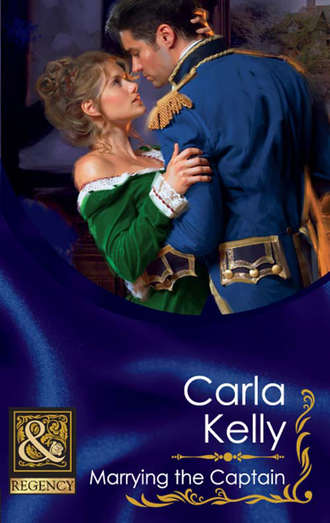
Полная версия
Marrying the Captain
“And breakfast?”
She shook her head, too embarrassed to look at him. He was still holding her wrist, but his grip was easy.
He let go of her then, and relaxed against the pillows again. “All I need tonight is another pitcher of water. Would you do me a favor?”
“Anything, Captain,” she said and meant it.
“Ask Pete if he knows a good remedy for sailor’s throat.”
“He has a thousand cures, almost as many as Scheherazade had tales.”
Her answer made him smile. “I’ll wager he has. And might your… your grandmama know of a poultice for my throat?”
That is odd, she thought. How does he know about Gran? “Have you stayed here before?” she asked. “I don’t believe I mentioned Gran.”
It was his turn to look confused. “Pete must have said something,” he replied.
“That’s a whopper,” she said candidly, looking him in the eyes.
He looked at her in exasperation. “I do believe an older woman was in here when Pete relieved me of my uniform and bared me to the skin, but I didn’t want to be so indelicate!”
She left the room, smiling to herself.
Gran put the money in the strongbox she kept in the drawer under the bread box. Only a few coins remained from Nana’s haircut, and the sound of Captain Worthy’s money made Nana sigh with relief.
“I wonder why he’s doing this?” she asked her grandmother.
“Who knows?” Gran said. She turned to the nearly bare shelves and put her hands on her hips. “Nana, get on the stool and hand me that sack on the left. I can make the captain a poultice for his neck. I’ll send Pete to the apothecary’s for some oil and cotton wadding.”
“And food, too, Gran, food,” Nana said. “He wants porridge and cream for breakfast.”
Gran rested her hand on Nana’s shoulder. “You’ve been hungry.” It was a simple statement. “Maybe our luck is turning.”
And hour later, Nana carried the poultice upstairs. It was made of wheat, simply heated and packed into a clean stocking someone had left behind, back when the Mulberry had lodgers. Gran had wrapped it in a dish towel so she could carry it. “We may leave it wrapped in that, too,” she said as Nana knocked on the door. “It wouldn’t do to cause him bodily harm, not after he’s paid so much for our help.”
Gran carried the oil Pete had brought from the apothecary before he left again to convince a grocer to open his shop. She warmed the vial in her hands.
The captain was asleep, but he rolled over as soon as she tiptoed into the room. He was half out of bed before he realized who it was.
“Lie down, Captain. You’re not on the blockade now,” Gran ordered. “Turn over. I’ll put some oil in your ears.”
He did as she demanded. Gran dropped oil in each ear and plugged it with cotton. She motioned Nana forward.
“Just drape it around his neck. That’s the way,” she said, as Nana lifted the poultice over the captain’s head. “Settle it around his ears, too.”
The captain was silent as she followed Gran’s instructions. She leaned close to him, wrinkling her nose to discover that Captain Worthy smelled of brine. Trying not to be obvious, she sniffed his shabby nightshirt. Salt again. Surely they didn’t wash their clothes in salt water.
When she finished, Gran settled the captain back against the raised pillows. “That should do,” she said. “Come, Nana, let us leave this man in peace.”
Gran left the room. Nana made to follow, but the captain cleared his throat and she turned back to the bed, a question in her eyes.
“Make sure I am up by seven,” he said. “I’ll eat breakfast downstairs and then go to the dry docks.”
“I don’t think so, Captain,” she replied. “You’re a sick man.”
“All the same, Miss Massie, that’s an order.”
“Aye, sir,” she said, amused, “though I doubt you’ll be going anywhere for at least a week.”
“Try me.” There was no amusement in his voice. “I’ll be at the dry docks tomorrow if Pete has to push me in a wheelbarrow.”
After she left, he lay in bed, trying to think about the Tireless, and not about Nana Massie. He thought of Lord Ratliffe’s concern for her, and wanted to know why on earth she had decided to return to Plymouth, rather than continue to receive the comforts her father seemed ready to offer. It was not his business, though.
Chapter Two
Drat her pretty hide, Nana Massie was right; he was a sick man.
Oliver woke before it was light. His throat ached and his ears throbbed, but at least the pain in his shoulders was less, thanks to the wheat poultice still strung around his neck. It had ceased to give off warmth hours ago, but the smell of wheat had set him dreaming of bread—loaves unbelievably tall from yeast, soft, slathered in melting butter, and nary a weevil in sight.
He was cold. Through the fog of last night’s humiliation at vomiting on the pansies, then crawling into bed and shutting out the world, he remembered Gran or Nana saying something about extra blankets in the bottom drawer of the clothespress. He thought about getting up to retrieve another blanket, but he was disinclined to so much exertion.
As he lay there, thinking about the merits of another blanket, the door opened. The ‘tween-stairs maid, he thought, has come to rescue me from the cold. He lay there, peaceful, in spite of his pain, and thankful for the prospect of more coal on the fire.
She laid a quiet fire—how many inns had he frequented where the opposite was true. In another minute the room would be his again, and warmer. Maybe he wouldn’t need another blanket, after all.
She didn’t leave. He heard her opening the lower drawer of the clothespress; in another minute, she covered him with a welcome blanket. Even that wasn’t enough. She tucked it high on his shoulders, bending close enough in the low light until he saw it was Nana Massie, and no ‘tween-stairs maid.
“I could have done that,” he told her, sounding gruffer than he meant to, maybe because his throat seemed filled with foreign substances.
“I know,” she whispered, apparently not in the least deterred by his tone. “You’re not the only human on the planet who sometimes lies in bed because he—or she—is too indecisive to get up for another blanket.”
He couldn’t help chuckling at her observation on human nature, even as he wished there was a ‘tween-stairs maid at the Mulberry. He hated to think the daughter of a viscount had to work so hard, even if she was illegitimate.
What an uncharitable man you are, he told himself sourly. Who on earth has a say in the pedigree of her birth?
She tugged the blanket higher around his shoulder. “Go back to sleep, Captain. I’ll bring your breakfast in an hour, and then Pete has a foul concoction to try on you.”
“I told you I’d get up for breakfast,” he reminded her.
“I have decreed otherwise,” she replied in complete serenity.
To his surprise, he did precisely as she ordered and went back to sleep. When he woke again, the sun was up. At least, watery dawn seeped around the curtains. He heard a shutter banging somewhere across the street from the force of the wind outside, but the Mulberry itself seemed sound as a roast. Somewhat like its inhabitants, he concluded, as he sat up slowly.
He eased himself out of bed, found the chamber pot under the bed and used it, hoping Nana wasn’t the one to dump it. He slid the chamber pot out of sight and crawled back into his warm nest, loath to leave it again, but knowing today he must visit the Tireless in the dockyard, and conduct all manner of shoreside business for the good of his crew and ship. Sometimes he wondered why he had not chosen the serene life of a country parson, like his father.
He lay there, going over everything he had to do that day, and realized he needed Mr. Proudy, his number one, close at hand. He knew he could summon the man and he would eventually appear, but why bother a fellow busily engaged in refreshing his wife? He had another idea. He didn’t know much about female academies in Bath, but Miss Massie could probably write. Of course, this meant he would have to succumb to breakfast in bed to placate her. The blockade had taught him a great deal about flexibility, however.
She knocked on the door a little later, when the wind had settled down and rain pattered against the window-pane.
“Come.”
She opened the door, carrying a tray of food and concentrating on keeping it level. Pete Carter stood behind her. It was all he could do to keep from sighing out loud. Nana Massie was beautiful. Thank God he had decided years ago that he would never be troubled by a wife. His personal pledge had only been strengthened in recent years by seeing too many distraught wives meeting ships in the harbor, hoping for news. He’d be damned if he’d do that to anyone.
He knew there was no ordinance against admiring a pretty woman, but his glimpse at Lord Ratliffe’s miniature and his own wretched state yesterday had not fully prepared him for Nana Massie.
Thank God I am too old for her and too kind—despite what my crew thinks—to punish a woman by loving her and leaving her for war on the ocean, he told himself. Those eyes. He had never noticed such round eyes on an adult. Or maybe it was her high-arched eyebrows that gave her a wide-eyed gaze. Whatever it was, he wanted to study the matter during some leisure time he knew he would never have.
And why shouldn’t I have that opportunity? he asked himself. Other men do. They must, or Adam and Eve would have had no offspring. He decided to indulge himself, and kept looking.
He thought her cheeks were too thin, but he knew that look could be cured with more food. He couldn’t properly assess her figure, because she wore the same stuff gown and apron. It was on the thin side, but that could be rectified, until she was softer and more rounded in all the right places.
Nana appeared to be one who could develop soft edges, if given the opportunity. What am I doing? he thought, as he admired her. She would thrash me across the chops, if she could read my mind.
All this reckoning had taken place in just a few seconds. Nana seemed to be unaware of his assessment because she was concentrating on placing the tray on his lap now, and adjusting the legs around him. On the other hand, Pete Carter didn’t look like someone who would allow much scrutiny of his little charge.
But here she was, bending over him. Oliver couldn’t help himself. He looked her square in the face, and smiled to see those freckles across the bridge of her nose, probably destined to fade as she aged, but there now to entertain him. And he was entertained, hugely so. He liked everything he saw.
He could have cried when Nana stepped back and folded her hands in front of her. “Porridge and cream, Captain, just what you ordered,” she told him. “I didn’t know how much sugar you liked, so I brought up the whole bowl. Gran stewed some apples, too, but we decided against any toast. Your throat, you know.”
He nodded, wishing she were still bending over him. She smelled faintly of roses, not a fragrance he chanced upon much, but far more appealing than tar, bilge and gunpowder.
He looked at her again. “Miss Massie, could you prop up these pillows? I’d hate to dribble porridge across my chest like a hospital pensioner, since you’re so determined I am to eat in bed.”
She did as he asked, plumping up the pillows behind him, then getting out another from the lower drawer of the clothespress. As she put that one behind his head, her arm brushed his temple. He was in heaven.
Then it was Pete Carter’s turn. As Nana stepped back, the old sailor set down a vile-looking compound on the bedside table. “For what ails you, Captain Worthy,” he said. “Drink all of that after you finish breakfast.”
Oliver eyed it suspiciously, wishing that Pete did not look so pleased with himself at the punishment he was inflicting. “All of it? Shouldn’t I spread it out over the day?”
“All of it, sir,” Pete insisted. “And when you’re done, I’ll bring up more.” He smiled then. “It’ll work, Captain. It always does. I guarantee the remedy.”
For one disconcerting moment, Oliver felt that he had returned to his midshipmen days, under the scrutiny of a sailing master. You old rascal, he thought to himself, as the former sailor whisked away the chamber pot, not giving Oliver a single moment to feel embarrassed.
He was struck with a moment of shyness after Pete left his chamber, then reminded himself of the business at hand. Even the Tireless could wait; Nana Massie was going to eat more.
“Miss Massie, have you had breakfast yet?”
He could tell his curt question came at her out of the blue. She blinked her eyes, and then thought about an answer. Oliver leveled her with a stare generally reserved for midshipmen contemplating prevarication.
“You promised me last night you would tell the truth,” he reminded her as he picked up his spoon.
“That was for last night,” she said quickly, then laughed at his expression. “Aye, sir, I did promise,” she amended. “The answer is no.”
He set down the spoon. “I’ll wait until you come back with a bowl and spoon. If there’s porridge left…”
“There is,” she said hurriedly, interrupting him. “We kept it back in case you wanted more.”
“I don’t.” Oliver looked down at the tray in his lap. “This is quite enough. Please take what you want from the pot and come back.”
Without a word, she left the room, closing the door behind her. He stared down at the porridge, certain he had offended her and wondering if his next step now was to dress and go in search of her. To apologize? To bully her further? He asked himself why it was suddenly his problem.
The porridge tasted like ambrosia. It was sugared precisely right and needed no more. It even went down smoothly, causing his raw throat no further indignity. Too bad he wasn’t enjoying it, feeling sorry for himself and pining for company.
To his relief, she came back into his room with a full bowl and spoon. She pulled up a chair to the bed and helped herself to the sugar in the bowl on his tray. “All the sugar is up here,” she explained.
He smiled into his porridge, surprised at how much better it tasted. He glanced at Nana, who was spooning down a mouthful, a beatific expression on her face. He looked away quickly, so she wouldn’t think he was spying on her. I probably dare not do this with every meal, but I can try, he told himself.
When he finished, he eyed Pete Carter’s concoction.
“Do you know this elixir?” he asked, his voice cautious.
“I’ve had it a time or two myself,” she said. “I recommend you drink it first, and then follow it with the applesauce.”
“Does it work?”
“You’re stalling, Captain,” she teased, and he knew she wasn’t angry with him about the porridge.
“I am indeed. Facing the French fleet is one thing.” He picked up the glass. “This is quite another.”
“Cowardice will land you onshore permanently, and at half pay.”
Well, Miss Massie, you seem to know something of the navy, he thought. “So you are appealing to my patriotism now?” he asked, then took a deep breath and drank down the brew, reasoning it couldn’t be any more vile than old water in rotten kegs.
It was more pleasant than he had any reason to hope, with a strong aftertaste of molasses and just a hint of rum. There were other ingredients he could not name, and had no desire to find out. Following it with applesauce proved to be good advice, and so he told Nana. She beamed with pleasure.
“I’ll bring you another pitcher of water,” she said, rising to leave.
“Bring a tablet and pencil when you return,” he ordered. “What time is it?”
“Half-past seven, Captain.”
He rubbed his hands together and lay back against the pillows again as she picked up the tray. “I intend to be dockside staring up at the Tireless by two bells in the forenoon watch. Oh. Nine o’clock.” She began to protest, but he overrode it. “I need to prepare some lists before I go. Will you help me?”
“I suppose,” she said, her expressive eyes a little wary.
He watched her face, noting her wariness, and put it down to reluctance to spend more time in his chamber. So that’s how it is? he thought. Gran must have warned you about officers, too. Well, good for Gran, if bad for me.
“I must establish a list of priorities,” he told her. “If my number one—my first mate—were here, I would order him to help me. He, alas for me, is in the arms of his wife of less than a year. Although my men will tell you I am a hard taskmaster, I am not without feeling. Miss Massie, plain and simple—will you help me?”
That was blunt enough, he thought, observing the blush that rose to her cheeks, rendering her even sweeter to look at than before. “I would ask Pete Carter, but I doubt he can write,” he continued.
“His name only,” she said. “He didn’t need anything else in the fleet.” She looked at him, as if weighing the matter against her usual duties. “I can help,” she told him.
“Good! Have Pete summon me a hackney for half-past eight o’clock.”
“You should stay in bed,” she said, but without much conviction in her voice.
“I should, but I can’t,” he told her, trying to sound reasonable and less like a captain. “Boney doesn’t much care about my putrid throat, and probably less about my ears.”
She didn’t seem to have an argument prepared for Napoleon. “Especially your ears,” she echoed, as she closed the door behind her.
Nana went down the stairs quietly. She had gone upstairs, mostly afraid of Captain Worthy, and come down with a revised opinion. He was blunt and plainspoken, but surely no more than any other seaman she had encountered in the years since her return to Plymouth. His apparent concern for her was a surprise; she did not know why he should feel any obligation to make sure she had something to eat.
“You don’t know anything about me,” she whispered, looking back up the stairs.
She passed into the sitting room at the foot of the stairs, and then to the equally small dining room that adjoined it. Gran had told her to prepare a table setting for Captain Worthy—one table among eight. It looked faintly ludicrous in the empty room. She sat down, thinking of their only other tenant at the inn, who had died last spring.
Miss Edgar—Nana never knew her Christian name—had been a governess, a lady somewhat down on her luck whose last position had been with the harbormaster’s family. When the two daughters had outgrown Miss Edgar’s services, she had not the funds to relocate anywhere else, nor the energy, at her advanced age, to try for another post. It seemed no one was interested in hiring an old lady whose French was getting rusty, and who had difficulty remembering the capitals of Europe.
She had come to the Mulberry because it was cheap and clean, and stayed there five years before her money ran out. From Nana’s fifteenth birthday on, when she visited Plymouth during holidays, she had observed Miss Edgar sitting by herself in the otherwise empty dining room, and spending her evenings alone in the sitting room.
Gran had tried to get Miss Edgar to join them in their own tidy quarters through the green baize door into the back of the inn. “All I ever wanted to do was invite her to share our company,” Gran had told Nana, and there was no disguising the hurt in her voice. “She won’t hear of it. We’re not quality.”
After Miss Edgar outlived all her savings, there was nowhere to go but the street. When she returned to Plymouth for good, Nana had been surprised to see Miss Edgar still in residence.
“I couldn’t throw her out,” Gran had told Nana later, after Miss Edgar had gone upstairs to her room. “She has never spoken of the fact that her money is gone, and she still refuses to share our low society, even while she eats our food and lives here for free.”
Nana gathered up the place setting meant for Captain Worthy, but she did not get up. Two months ago, Gran had nursed Miss Edgar through her final illness, closed the woman’s eyes in death and prepared the body for the grave before summoning the parish cemetery society, which ushered paupers into pine boxes and unmarked graves.
Together they had cleaned out Miss Edgar’s room, finding nothing of any value beyond yards of tatting, a few old books and a handful of letters. Nana was cleaning out the clothespress and its threadbare garments when Gran suddenly took her by the arm. “Miss Edgar and I could have been friends!” she had lamented, as her eyes filled with tears. “What’s even worse, I had thought your stay at Miss Pym’s would prepare you for a career such as hers.”
Nana had kissed Gran then, not telling her that Miss Pym had delicately informed her several years before that she would never be able to get such a position, because no family would countenance a governess with questionable parentage. But Gran didn’t need to know that. She had assured Gran she had no plans to ever leave the Mulberry.
Nana sat for a few more moments in the empty dining room. The rain drummed down outside as she contemplated class, rank and general stupidity. She wondered if Captain Worthy preferred an empty dining room to low company at the back of the inn.
Pete was out, but Gran and the scullery maid, Sal, were finishing the last of the porridge. “Captain Worthy wants me to take some dictation.” She found a tablet and pencil in the drawer where Gran kept her records. “He wants more drinking water.” She smiled at Sal. “If you would bring up some shaving water after a while, he means to visit the dry docks.”
“I doubt he can stand up,” Gran said.
“But he will,” Nana replied.
She thought Gran might offer an objection to her returning upstairs, but she did not. Muttering something about “catching his death in this rain,” Gran reached for the rest of the wheat, prepared to make a new poultice.
Tucking the pencil in her hair, the tablet under one arm and the pitcher in the other, Nana went back to Captain Worthy’s chamber. She tapped softly on the door. There was no answer. She tapped again, no louder, then looked inside the room.
He was asleep. She thought about going downstairs, but remembered what he had said about going to the dry docks. She set down the pitcher quietly and sat again beside his bed.
She was struck by the way he slept—directly in the middle of the bed, with his hands folded across his stomach. She couldn’t help but think of a man in a coffin, and the notion sent a ripple down her spine. She considered the man, and understood. Flailing about in a hammock or sleeping cot would probably have meant a quick trip to the deck below.
I wonder, does he ever turn over? she asked herself, curious. No matter. He was sleeping peacefully, his face probably as relaxed as it ever got. Captain Worthy had a sharp and straight nose set above thin lips. His hair was dark brown, with wisps of gray in it by his temples, as well as a faint, curved scar, circling below his cheekbone and nearly touching his right nostril. Pirates on the Barbary Coast? she thought. Or a grappling hook swung by a desperate Frenchman?
He shouldn’t be so concerned about her own paucity of meals, she decided, considering that he was on the thin side himself. His hands, so peacefully folded, were deeply veined. Her eyes went back to his face, toasted by coastal Spanish sun to a pleasant mahogany that probably turned sallow during the winter. Nothing would change the weather lines around his eyes. She had lived enough of her life in Plymouth to know the mark of a deep water man.
He coughed, then tried to swallow, which marred his repose as he flinched from the pain in his throat, and uttered some small protest. Then he opened his eyes, looking directly overhead for a long moment, until he seemed to recall where he was.
He must have sensed her presence, because he addressed her, even as he continued to stare overhead.








